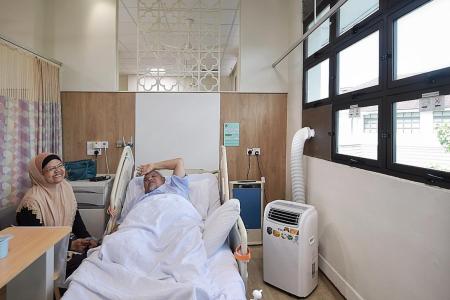Hospitals make rare move of closing windows over haze
Public sector hospitals have been closing the windows in subsidised wards and ventilating them with portable air-conditioning units to protect patients from the haze.
They are also actively monitoring their patients, many of whom are elderly and hence more susceptible to the effects of haze, so that remedial action can be taken immediately.
While slightly hazy conditions can still be expected today, the National Environment Agency (NEA) forecasts that air quality will improve.
The haze can cause breathing difficulties, including wheezing, and bring on attacks of asthma or bronchitis. It can also trigger migraine, eczema, tearing eyes and runny nose.
Good Pharma Dermatology said sales of eczema cream have risen by more than 30 per cent since the haze worsened here.
The Ministry of Health said it has reminded hospitals, polyclinics and nursing homes "to put in place haze-preparedness measures and prepare for any increase in the number of cases of haze-related conditions".
These include using air purifiers, fans and portable air coolers to reduce temperatures in the wards.
NATURAL VENTILATION
All subsidised wards in public hospitals have to be "naturally ventilated" according to policy.
A certain level of discomfort was considered necessary to prevent poor patients from abusing the healthcare system.
The 1993 White Paper on Affordable Healthcare said that otherwise, "there is no limit to the amount of medical care which patients might want, and which the state will have to subsidise".
Although some hospitals now do provide air cooling in subsidised wards, having discovered that cooler air reduces medical problems like bedsores, which can result in longer stays for patients, they have to keep windows open to comply with the need for natural ventilation.
It is only with the arrival of the haze that they are closing windows in their subsidised wards.
Senior security officer Haron Jasmin, 65, who is in Alexandra Hospital for gout flare and lung infection, said: "I find the air in the ward, even though the windows are closed, fresh and nice; not dusty."
A spokesman for Khoo Teck Puat and Yishun Community hospitals said the hospitals have ensured they have sufficient stockpiles of masks and relevant medication.
The National University Health System, which runs the National University, Ng Teng Fong, Alexandra and Jurong Community hospitals, said it has added filters to the air-conditioning system "to minimise pollutants and smell in the air".
Its spokesman said that at its polyclinics, the elderly, pregnant women, children and those with chronic respiratory and heart diseases will be given priority for consultations and treatment. Staff who are susceptible to the ill-effects of the haze have been redeployed to work indoors, she said.
Get The New Paper on your phone with the free TNP app. Download from the Apple App Store or Google Play Store now



